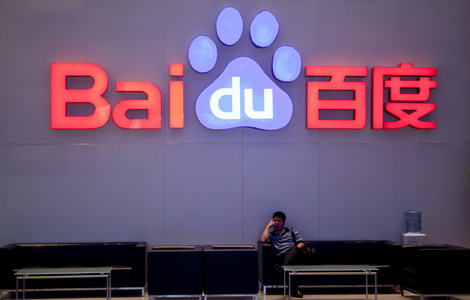Companies
Baidu, BMW link up for vehicle-based searches
Updated: 2011-08-09 10:43
By Chen Limin (China Daily)
|
 |
|
Baidu Inc and German automaker BMW agree on Monday to develop and operate search products based on vehicles' information systems. The arrangement will allow Baidu to expand to different terminals. [Photo / China Daily] |
BEIJING - Baidu Inc, China's biggest search engine, will partner with Bayerische Motoren Werke AG (BMW) to provide search services in the German automobile maker's vehicles, part of its drive to push search services onto more platforms.
The two companies agreed to develop and operate search products based on vehicles' information systems, Baidu said in a statement on Monday. This means Baidu's search services will go beyond personal computers, mobile phones and televisions and expand to automobiles.
"We hope people can easily find the information they want through Baidu's 'box', no matter what kind of terminal they use," said Zhang Dongchen, Baidu's assistant president.
The search services Baidu will provide in vehicles include maps, e-mail and news. The search engine has also been talking to other vehicle makers about similar services, according to the statement.
Baidu's cooperation with BMW is a move to explore a niche market, as well as a method of expanding to different terminals, said analysts. However, in the automobile sector, there are already established players that will be strong rivals for Baidu.
"Different players within the industrial chain, including hardware vendors, automobile makers and service providers, have many resources in providing information services in automobiles," said Yan Xiaojia, an analyst with domestic research company Analysys International.
"Baidu has its own advantages in searching, but how far it can go in the automobile sector depends on the efforts and investment" it makes, he added.
The company previously entered into a cooperation agreement with Wasu Digital Television Media Group, a Chinese digital TV operator, to provide search services on TV in some 100 domestic cities.
In addition to its core search business, Baidu has been trying to diversify its revenue sources, including the establishment of an e-commerce website with Japan's Rakuten Inc and increasing its investment in its online video arm.
Baidu had 75.9 percent of the country's search market last quarter, followed by rival Google Inc's 18.9 percent, according to Analysys International.
Google's share of China's search market, in terms of revenue, peaked in the fourth quarter of 2009 at 35.9 percent. Its share has fallen, especially since it shut down its Google.cn service and redirected all mainland traffic to Hong Kong last March.
E-paper

My Chinese Valentine
Local businesses are cashing in on a traditional love story involving a cow herder and a goddess
Outdoor success
Lifting the veil
Allure of mystery
Specials

Sowing the seeds of doubt
The presence in China of multinationals such as Monsanto and Pioneer is sparking controversy

Lifting the veil
Beijing's Palace Museum, also known as the Forbidden City, is steeped in history, dreams and tears, which are perfectly reflected in design.

Beer we go
Early numbers not so robust for Beijing's first international beer festival
